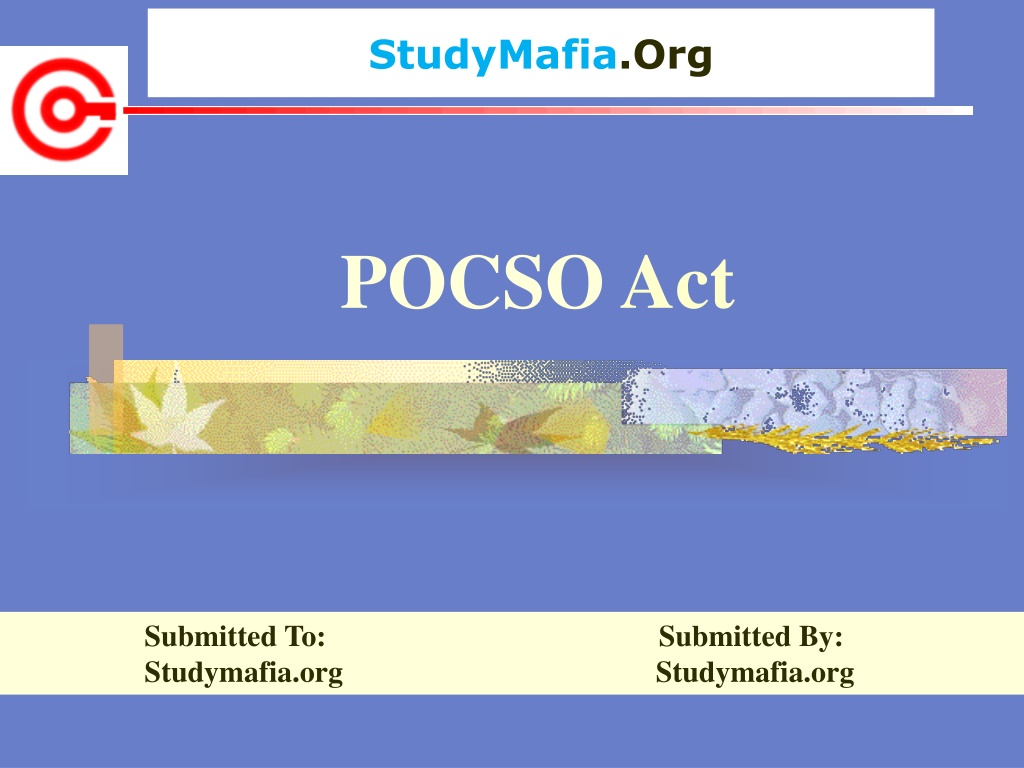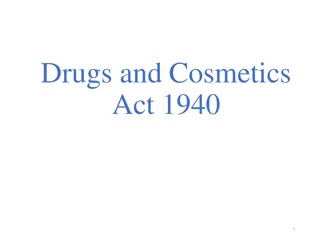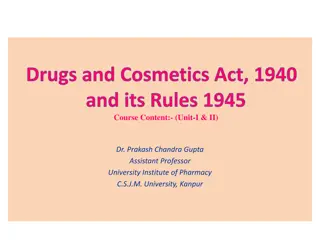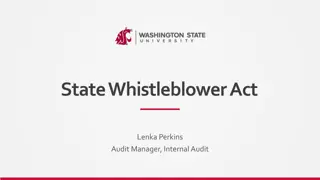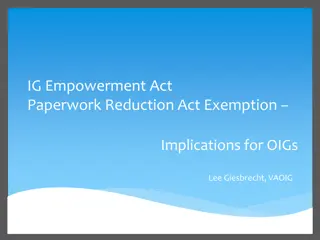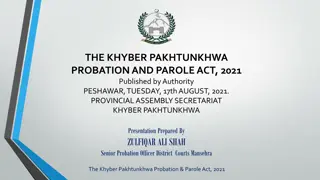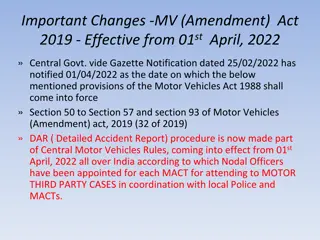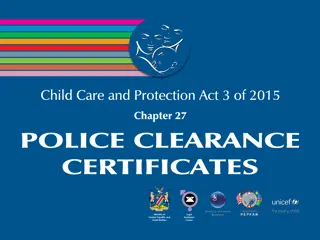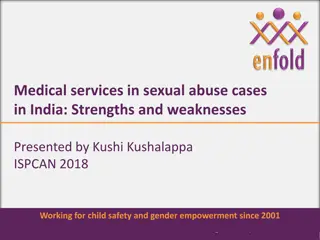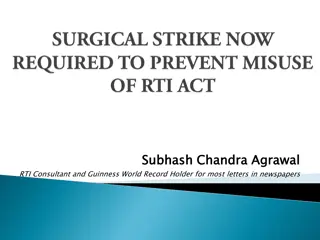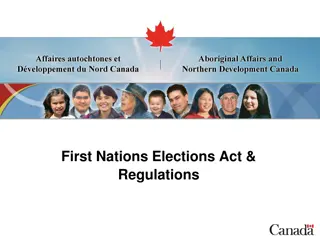POCSO Act
"The submission of the POCSO Act to StudyMafia.org by Studymafia.org signifies a significant step towards addressing and preventing child sexual abuse. This act aims to protect children from various forms of sexual exploitation and create a safer environment for their development and well-being. By submitting the act, the organizations showcase their commitment to safeguarding children's rights and advocating for their protection under the law."
Download Presentation

Please find below an Image/Link to download the presentation.
The content on the website is provided AS IS for your information and personal use only. It may not be sold, licensed, or shared on other websites without obtaining consent from the author.If you encounter any issues during the download, it is possible that the publisher has removed the file from their server.
You are allowed to download the files provided on this website for personal or commercial use, subject to the condition that they are used lawfully. All files are the property of their respective owners.
The content on the website is provided AS IS for your information and personal use only. It may not be sold, licensed, or shared on other websites without obtaining consent from the author.
E N D
Presentation Transcript
StudyMafia.Org POCSO Act Submitted To: Submitted By: Studymafia.org Studymafia.org
Table Contents Definition Introduction Need of POCSO Act Scope of POCSO Act Importance of POCSO Act Features of POCSO Act Principles of POCSO Act Conclusion 2
Definition The Protection of Children from Sexual Offences Act, 2012 [ POCSO Act, 2012 ] is legislation which aims at protecting children from all types of sexual abuse. 3
Introduction Although the Convention on the Rights of the Child was adopted by the United Nations in 1989, the offences against children were not redressed by way of any legislation in India till the year 2012. POCSO Act, 2012 is divided into 46 sections. It was published in the official gazette on 20th June 2012 but came into force on 14th November 2012 4
Need of POCSO Act Before the introduction of the POCSO Act, 2012, the sole legislation in India that aimed at protecting the rights of a child was the Goa s Children s Act, 2003 and Rules, 2004. Under the Indian Penal Code, 1860, child sexual abuse accounted for an offence under Sections 375, 354 and 377. These provisions neither protect male children from sexual abuse nor protect their modesty. 6
Need of POCSO Act Owing to the lack of any specific legislation, it was pivotal to establish a statute that pointedly tackles the issue of growing child sexual abuse cases in the country. With the efforts of multifarious NGOs, activists and the Ministry of Women and Child Development, POCSO Act, 2012 was enforced on 14th November 2012. 7
Scope of POCSO Act In India, POCSO Act, 2012 is not the only legislation which deals with child sexual abuse cases. The POCSO Act cannot be called a complete code in itself and provisions of the Code of Criminal Procedure, 1973, Indian Penal Code, 1860, Juvenile Justice Act, and Information Technology Act, 2000 overlap and encapsulate the procedure and specify the offences. 8
Importance of POCSO Act POCSO Act, 2012 was enacted when the cases of sexual abuse against children were rising. It contains provisions regarding the protection of children from sexual assault and pornography and lays down the procedure for the implementation of these laws. 9
Importance of POCSO Act Incidents of sexual abuse against children occur at schools, religious places, parks, hostels, etc and the security of children is not guaranteed anywhere. With such emerging dangers, it was significant to introduce separate legislation which could provide a reliable system for mitigating the number of such offences and punishing the perpetrators. 10
Importance of POCSO Act The Act has been instrumental in providing a robust justice mechanism for the victims of sexual abuse and has highlighted the significance of child rights and safety. The reporting of cases of child sexual abuse has also surged as a consequence of awareness. The Act covers punishment for both non-penetrative sexual assault and aggravated penetrative sexual assault. 11
Features of POCSO Act Confidentiality of the victim s identity: Section 23 of the POCSO Act provides for the procedure of media and imposes the duty to maintain the child victim s identity unless the Special Court has allowed the disclosure. 12
Features of POCSO Act Gender-neutral provisions: Another glaring feature of the POCSO Act is that it does not create any distinction between the victim or the perpetrators on the basis of their gender. This overcomes one of the biggest shortcomings of the Indian Penal Code s provisions. 13
Features of POCSO Act Mandatory reporting of child abuse cases: Sexual abuse cases happen behind closed doors and the elders attempt to hide these incidents due to the stigma that is attached to these crimes. 14
Features of POCSO Act The last seen theory: According to this theory, the person who is last seen with the victim is assumed to be the perpetrator of the offence when the time gap between the point when they were last seen alive is so minute that it is not possible that any other person could have committed the crime. 15
Features of POCSO Act Child-friendly investigation and trial: Sections 24, 26 and 33 of the POCSO Act lay down the procedure of investigation and trial which has been formulated keeping in mind the needs of a child. 16
Principles of POCSO Act Right to be treated with dignity- Various provisions under the POCSO Act reflect that it is very crucial to treat a child with dignity and utmost compassion. Right to life and survival- Right to life is a fundamental right provided by Article 21 of the Indian Constitution. 17
Principles of POCSO Act Right against discrimination- This is also a crucial fundamental right and an additional duty under the Indian Constitution. Right to preventive measures- Children being immature in their growing stages, should be well trained so that they become capable of preventing abuses against them thereby differentiating between what is right and what is wrong. 18
Principles of POCSO Act Right to be informed- A child should be informed of the legal procedures that are being carried out for the conviction of the accused. Right to privacy- The main objective behind provisions like Section 23 is to protect the right to privacy of a child against whom any offence under the POCSO Act 19
Conclusion POCSO Act, 2012 was enacted when the cases of sexual abuse against children were rising. It contains provisions regarding the protection of children from sexual assault and pornography and lays down the procedure for the implementation of these laws. 21
Thanks To StudyMafia.org
